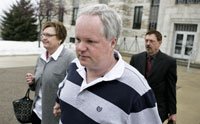David Baxter PhD
Late Founder
Police probe whether U.S. man encouraged Ottawa student's suicide
CBC News
Thursday, February 26, 2009
Nadia Kajouji's death was ruled a suicide. Police in Minnesota are now investigating if a man posing as a woman of the same age on the internet influenced her decision.
Nearly a year after an 18-year-old Brampton woman's suicide in Ottawa, her family is dealing with the possibility that deceptive internet messages from a man in Minnesota may have played a role in her decision to die.
Nadia Kajouji was in her first year at Carleton University when her body was found in the Rideau River last April. Her death was ruled a suicide.
Her father, Mohammad Kajouji, said Wednesday that police in Minnesota are investigating whether a male nurse may have played a role in his daughter's death.
Kajouji said he had no idea his youngest child and only daughter had been struggling with depression and was on medication. "That's what hurt the most," he said.
Kajouji now has 30 pages of internet conversations between his daughter and someone claiming to be a woman of the same age.
In graphic detail the person tells Nadia how to harm herself.
"She [the internet correspondent] was telling her how bad the medication is she's on, and she was advising her to make it easier for herself, how to hurt herself," said Kajouji.
The final communication occurred the same evening Nadia was last seen, March 9, 2008.
About four or five weeks after his daughter went missing Ottawa police showed Kajouji the emails. Not long after that his daughter's body was found.
Now police investigators in St. Paul, Minn., have contacted Kajouji and have told him the person his daughter was communicating with was a male nurse in his late 30s from the U.S.
"What would really make me happy is to expose this man in Minnesota and this country, so he doesn't do it to other families," Kajouji said.
"Because I'm sure he's done it before and he's going to do it again. But if they keep hiding his name and his face, he can go home and try it again on some [other] poor kid."
Peter Panos, with the St. Paul Police Department in Minnesota, confirmed the force's Internet Crimes Against Children unit has been investigating for months.
"We don't want to give out too much," he told CBC News.
"As this thing kind of wraps up, we will be putting out a lot more information on how it all came to us ? and how we came from going where we were, originally, to the connection in Canada," said Panos.
CBC News
Thursday, February 26, 2009
Nadia Kajouji's death was ruled a suicide. Police in Minnesota are now investigating if a man posing as a woman of the same age on the internet influenced her decision.
Nearly a year after an 18-year-old Brampton woman's suicide in Ottawa, her family is dealing with the possibility that deceptive internet messages from a man in Minnesota may have played a role in her decision to die.
Nadia Kajouji was in her first year at Carleton University when her body was found in the Rideau River last April. Her death was ruled a suicide.
Her father, Mohammad Kajouji, said Wednesday that police in Minnesota are investigating whether a male nurse may have played a role in his daughter's death.
Kajouji said he had no idea his youngest child and only daughter had been struggling with depression and was on medication. "That's what hurt the most," he said.
Kajouji now has 30 pages of internet conversations between his daughter and someone claiming to be a woman of the same age.
In graphic detail the person tells Nadia how to harm herself.
"She [the internet correspondent] was telling her how bad the medication is she's on, and she was advising her to make it easier for herself, how to hurt herself," said Kajouji.
The final communication occurred the same evening Nadia was last seen, March 9, 2008.
About four or five weeks after his daughter went missing Ottawa police showed Kajouji the emails. Not long after that his daughter's body was found.
Now police investigators in St. Paul, Minn., have contacted Kajouji and have told him the person his daughter was communicating with was a male nurse in his late 30s from the U.S.
"What would really make me happy is to expose this man in Minnesota and this country, so he doesn't do it to other families," Kajouji said.
"Because I'm sure he's done it before and he's going to do it again. But if they keep hiding his name and his face, he can go home and try it again on some [other] poor kid."
Peter Panos, with the St. Paul Police Department in Minnesota, confirmed the force's Internet Crimes Against Children unit has been investigating for months.
"We don't want to give out too much," he told CBC News.
"As this thing kind of wraps up, we will be putting out a lot more information on how it all came to us ? and how we came from going where we were, originally, to the connection in Canada," said Panos.



